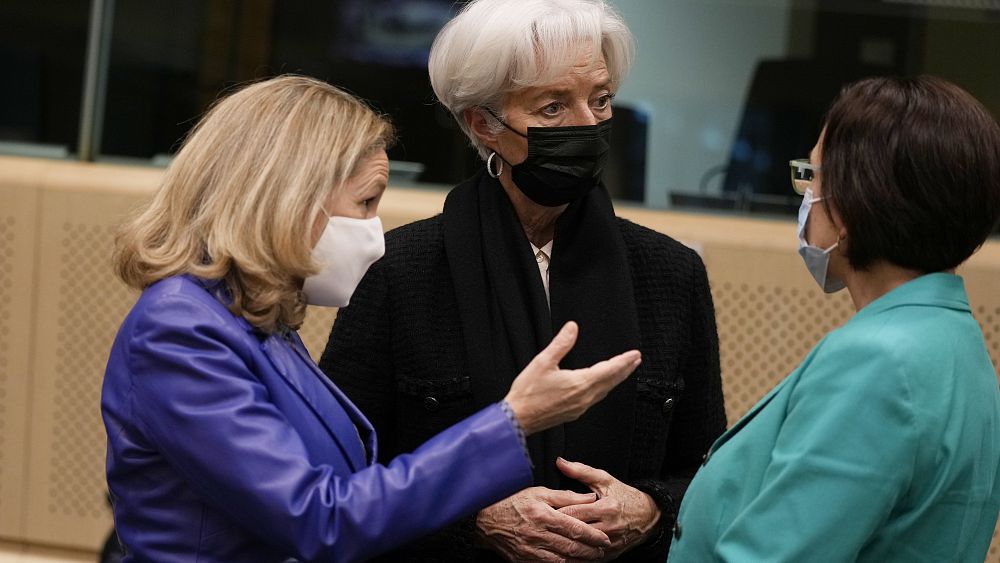
Rethinking economic governance in a post-COVID-19 Europe is already at the heart of EU member states’ discussions.
Eurozone finance ministers held talks in Brussels this week on what to do with the Stability and Growth Pact (SGP), which has been on ice since the beginning of the pandemic.
The review of the so-called fiscal rulebook restarted in a way unlike ever before.
Public debt has been significantly increased, regional, economic and social divides have become worse, inflationary pressures persist in generating uncertainties, and the Recovery and Resilience Facility (RRF), otherwise known as the pandemic recovery fund, gave another direction to the EU’s project.
This leaves EU policymakers with the unwanted task of not only addressing pre-existing deficiencies of their rulebook, but also the urgency to address post-pandemic challenges, including the green and digital transitions.
What is the SGP and why is it important?
Described as the Eurozone’s fiscal rulebook, the SGP is a set of fiscal rules designed to prevent EU countries from spending beyond their means.
Since 1997, member states have agreed that they should keep GDP ratios of deficit and debt below 3% and 60% respectively.
The European Commission and the Council finance ministers have the main duty of surveillance.
They issue an annual recommendation on policy measures every year and also monitor EU countries to ensure each nation is compliant with budget regulations.
Countries that break the rules for three consecutive years are fined a maximum of 0.5% of their GDP, something that in reality never happens, although the threat, particularly against southern European countries, has always loomed.
Loved and loathed
The SGP has often been criticised for its strict and inflexible fiscal rules, although there have been several reforms and complementary mechanisms over the years.
But, for the most part, the framework remains strict.
Some complain that it mainly serves to punish the poorest and weaker member states, while others, such as France that breached the 3% deficit limit several times never really faced the threat.
Former European Commission President, Jean-Claude Juncker, once gave an honest but cynical answer that summed up the matter well: ‘France is France’.
Impact of COVID-19 and internal divisions
In March 2020, the European Commission activated a general escape clause in the SGP, allowing member states to exceed the normal deficit and debt limits due to the sudden economic shock caused by the COVID-19 pandemic.
These rules will remain suspended until 2023.
A public consultation was finalised at the end of 2021 and now it’s up to the European Commission to bring a proposal to the table and let the tug of war begin.
France, which holds the rotating EU Council Presidency until June, hopes that the new framework will be finalised under its guidance, something that diplomats in the EU find ambitious and highly unlikely.
This is because divisions are still deep between member states, in large part due to the financial crisis of 2007-2008.
France’s finance minister Bruno Le Maire, set the tone for his country’s priorities at the Eurogroup meeting in Brussels.
“We will need to have a pact of growth. Growth comes before stability, sustainable growth, fair growth, essential growth for all European citizens. So we have to see what kind of investment we should have to reach a greener growth,” Le Maire said on Monday.
But the new German Finance Minister, the liberal Christian Lindner, known as a hardliner, was even clearer when it comes to the rules.
“In my eyes, the Stability and Growth Pact has proved its flexibility during the crisis, but now it’s time to build up fiscal buffers again,” Lindner said. “We need to be resilient not only in the private sector, but also in the public sector and that’s why I am very much in favour of reducing sovereign debt and this is one of the important details and this year I believe we will have a comprehensive approach on that.”
France, which wants to drastically soften the SGP, will surely be supported by Italy and southern member states, including Greece, Portugal, and Spain.
French President Emmanuel Macron and Italian Prime Minister Mario Draghi stressed in a joint article last month that “key spending for the future” should be incentivised under a revised set of rules indicating that strategic investments should be exempt from EU spending rules.
Resistance is expected from the so-called frugal countries, with some in Germany and Austria already calling for 2023 to see a return to the original rules of fiscal discipline and supervision to avoid wasteful spending.
The EU is, in any case, far from reaching a political consensus.
Currently, the new normal for the bloc’s economies include high public debts and commitments to public investment for the green and digital transformations.
Whether EU policymakers have actually learnt the lessons of the past, as they say, remains to be seen.